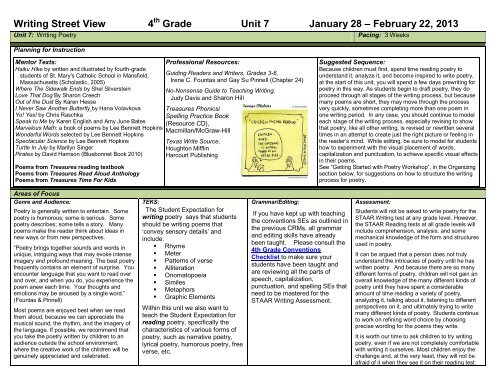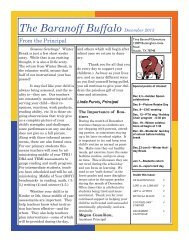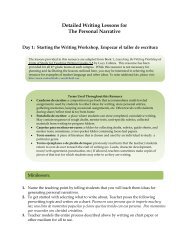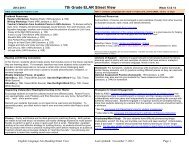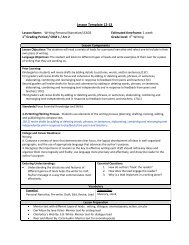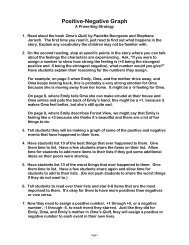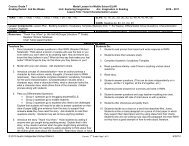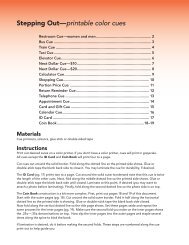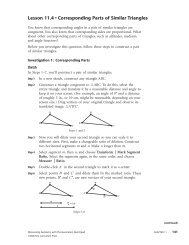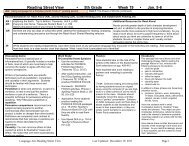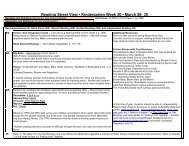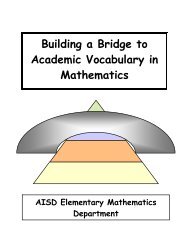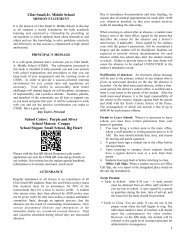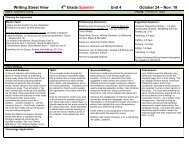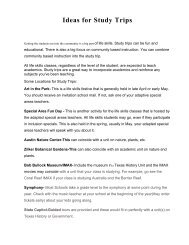Writing Street View 4th Grade Unit 6 January 7 25, 2013 - Office of ...
Writing Street View 4th Grade Unit 6 January 7 25, 2013 - Office of ...
Writing Street View 4th Grade Unit 6 January 7 25, 2013 - Office of ...
Create successful ePaper yourself
Turn your PDF publications into a flip-book with our unique Google optimized e-Paper software.
<strong>Writing</strong> <strong>Street</strong> <strong>View</strong> 4 th <strong>Grade</strong> <strong>Unit</strong> 7 <strong>January</strong> 28 – February 22, <strong>2013</strong><strong>Unit</strong> 7: <strong>Writing</strong> PoetryPacing: 3 WeeksPlanning for InstructionMentor Texts:Haiku Hike by written and illustrated by fourth-gradestudents <strong>of</strong> St. Mary's Catholic School in Mansfield,Massachusetts (Scholastic, 2005)Where The Sidewalk Ends by Shel SilversteinLove That Dog By Sharon CreechOut <strong>of</strong> the Dust By Karen HesseI Never Saw Another Butterfly by Hana VolavkovaYo! Yes! by Chris RaschkaSpeak to Me by Karen English and Amy June BatesMarvelous Math: a book <strong>of</strong> poems by Lee Bennett HopkinsWonderful Words selected by Lee Bennett HopkinsSpectacular Science by Lee Bennett HopkinsTurtle In July by Marilyn SingerPirates by David Harrison (Bluebonnet Book 2010)Poems from Treasures reading textbookPoems from Treasures Read Aloud AnthologyPoems from Treasures Time For KidsPr<strong>of</strong>essional Resources:Guiding Readers and Writers, <strong>Grade</strong>s 3-6,Irene C. Fountas and Gay Su Pinnell (Chapter 24)No-Nonsense Guide to Teaching <strong>Writing</strong>,Judy Davis and Sharon HillTreasures Phonics/Spelling Practice Book(Resource CD),Macmillan/McGraw-HillTexas Write Source,Houghton MifflinHarcourt PublishingSuggested Sequence:Because children must first, spend time reading poetry tounderstand it, analyze it, and become inspired to write poetry,at the start <strong>of</strong> this unit, you will spend a few days prewriting forpoetry in this way. As students begin to draft poetry, they doproceed through all stages <strong>of</strong> the writing process, but becausemany poems are short, they may move through the processvery quickly, sometimes completing more than one poem inone writing period. In any case, you should continue to modeleach stage <strong>of</strong> the writing process, especially revising to showthat poetry, like all other writing, is revised or rewritten severaltimes in an attempt to create just the right picture or feeling inthe reader’s mind. While editing, be sure to model for studentshow to experiment with the visual placement <strong>of</strong> words,capitalization and punctuation, to achieve specific visual effectsin their poems.See “Getting Started with Poetry Workshop”, in the Organizingsection below, for suggestions on how to structure the writingprocess for poetry.Areas <strong>of</strong> FocusGenre and Audience:Poetry is generally written to entertain. Somepoetry is humorous; some is serious. Somepoetry describes; some tells a story. Manypoems make the reader think about ideas innew ways or from new perspectives.“Poetry brings together sounds and words inunique, intriguing ways that may evoke intenseimagery and pr<strong>of</strong>ound meaning. The best poetryfrequently contains an element <strong>of</strong> surprise. Youencounter language that you want to read overand over, and when you do, you experience thepoem anew each time. Your thoughts andemotions may be aroused by a single word.”(Fountas & Pinnell)Most poems are enjoyed best when we readthem aloud, because we can appreciate themusical sound, the rhythm, and the imagery <strong>of</strong>the language. If possible, we recommend thatyou take the poetry written by children to anaudience outside the school environment,where the creative work <strong>of</strong> the children will begenuinely appreciated and celebrated.TEKS:The Student Expectation forwriting poetry says that studentsshould be writing poems that‘convey sensory details’ andinclude:• Rhyme• Meter• Patterns <strong>of</strong> verse• Alliteration• Onomatopoeia• Similes• Metaphors• Graphic ElementsWithin this unit we also want toteach the Student Expectation forreading poetry, specifically thecharacteristics <strong>of</strong> various forms <strong>of</strong>poetry, such as narrative poetry,lyrical poetry, humorous poetry, freeverse, etc.Grammar/Editing:If you have kept up with teachingthe conventions SEs as outlined inthe previous CRMs, all grammarand editing skills have alreadybeen taught. Please consult the<strong>4th</strong> <strong>Grade</strong> ConventionsChecklist to make sure yourstudents have been taught andare reviewing all the parts <strong>of</strong>speech, capitalization,punctuation, and spelling SEs thatneed to be mastered for theSTAAR <strong>Writing</strong> Assessment.Assessment:Students will not be asked to write poetry for theSTAAR <strong>Writing</strong> test at any grade level. However,the STAAR Reading tests at all grade levels willinclude comprehension, analysis, and somemechanical knowledge <strong>of</strong> the form and structuresused in poetry.It can be argued that a person does not trulyunderstand the intricacies <strong>of</strong> poetry until he haswritten poetry. And because there are so manydifferent forms <strong>of</strong> poetry, children will not gain anoverall knowledge <strong>of</strong> the many different kinds <strong>of</strong>poetry until they have spent a considerableamount <strong>of</strong> time reading a variety <strong>of</strong> poetry,analyzing it, talking about it, listening to differentperspectives on it, and ultimately trying to writemany different kinds <strong>of</strong> poetry. Students continueto work on refining word choice by choosingprecise wording for the poems they write.It is worth our time to ask children to try writingpoetry, even if we are not completely comfortablewith writing it ourselves. Most children enjoy thechallenge and, at the very least, they will not beafraid <strong>of</strong> it when they see it on their reading test.


